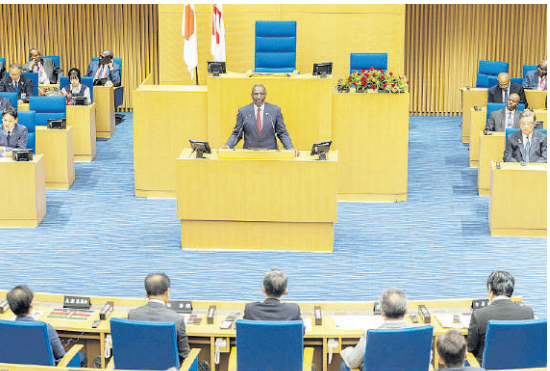

Kenyatta National Hospital, Kenya’s largest referral facility, is set to launch a new training programme in collaboration with a Japanese organisation, Africa Health Dynamics Limited.
This initiative, stemming from the signing of a memorandum of understanding yesterday, aims to elevate the skills and capacities of healthcare workers at KNH, ensuring they are equipped to provide world-class medical services.
The announcement was made by Health CS Aden Duale on the sidelines of the ongoing Tokyo International Conference on African Development (Ticad).
Duale expressed optimism about the programme, highlighting its potential to transform the hospital’s workforce and improve patient care.
“This is a major development for us considering our desire to build competitive and world-class human capital,” Duale said.
“The collaboration with Africa Health Dynamics will bring invaluable expertise and resources that will empower our healthcare professionals,” he added.
Africa Health Dynamics Limited specialises in healthcare consulting and management services across the African continent.
Their focus includes a range of initiatives aimed at improving health systems, which aligns perfectly with the goals of the KNH.
The training programme is expected to cover various aspects of healthcare, including innovative solutions, digital health technologies and best management practices.
The initiative is particularly timely, as the Kenyan healthcare system faces numerous challenges, including a shortage of skilled personnel, high patient volumes and the need for modernisation.
By investing in human capital through targeted training, KNH aims to address these issues and enhance the quality of care provided to patients.
In addition to skill enhancement, the collaboration will also focus on public health initiatives that address pressing health challenges in Kenya. This includes disease prevention and health promotion strategies that are critical for improving overall community health.
The partnership with Africa Health Dynamics will not only provide training but also facilitate research and development efforts.
“This will ultimately lead to better health outcomes for our people,” said a statement from the organisation.
By conducting research that informs healthcare policies and practices, the programme aims to create a sustainable model for improving healthcare delivery in Kenya.
“Our goal is to ensure that healthcare professionals are not only well-trained but also equipped with the latest research and practices in the field,” Duale noted.
The signing of the MoU is part of Kenya’s broader strategy to strengthen international partnerships in healthcare.
By collaborating with organisations like Africa Health Dynamics, the Kenyan government aims to leverage global expertise and resources to address local health challenges.
Japan has a long-standing commitment to supporting healthcare initiatives in Africa and this partnership aligns with their objectives to enhance health systems across the continent.
The Ticad conference serves as a platform for African nations and international partners to discuss and collaborate on sustainable development goals, including health.
One of the most pressing issues in Kenya’s healthcare system is the ageing workforce, with many healthcare professionals nearing retirement.
The new training programme aims to attract younger professionals into the field, ensuring that there is a continuous supply of skilled workers to meet the growing demands of the healthcare sector.
Duale emphasised the importance of bringing young people into healthcare, stating, “We need to create an environment that encourages youth participation in the sector. This programme will not only enhance skills but also inspire the next generation of healthcare leaders,” he said.
Instant analysis
Kenyatta National Hospital’s partnership with Africa Health Dynamics marks a significant step in strengthening Kenya’s health workforce amid systemic challenges. With acute shortages of skilled personnel, high patient volumes and an ageing workforce, the training initiative is timely. By integrating digital health technologies, innovative solutions and best management practices, the programme positions KNH to modernise its services and attract young professionals into the sector. Beyond capacity building, the collaboration’s focus on research and public health initiatives could inform sustainable policies, aligning with Kenya’s broader push for international partnerships in healthcare. If implemented well, this programme could be transformative.
















